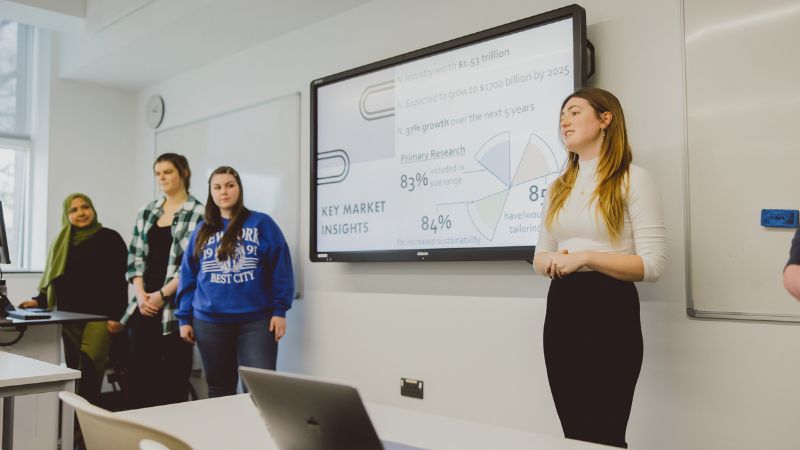Business, Enterprise and Entrepreneurship (with Foundation Year)
BA (Hons)
UCAS code: N10F
Start dates: September 2026
Full time: 4 years, or 5 if a work placement is chosen
Part time: up to 11 years
Location: Headington
School(s): Oxford Brookes Business School
Overview
Want to start a business and become your own boss? Eager to learn how to be entrepreneurial across different industries and roles? Our Business, Enterprise, and Entrepreneurship course with a Foundation Year is delivered by people who’ve walked the walk and can bust through the myths to get you on track.
Studying with us, you’ll experience a unique combination of application, practice and theory as you learn how to create jobs and growth in all kinds of businesses, from small family companies to not-for-profits to big corporations.
Whether you join us straight from school, you’re planning your fledgling venture or you’ve already got started, you’ll experience a top 5 UK city for start-ups and one of Europe’s top 20 tech hubs for investment. We’ll connect you with the people and organisations that can give you your big break. From placements to module options, you can tailor the course to reflect your goals.
If you decide to change focus, you can switch to Business and Management or International Business Management at the end of the first degree year.

Why Oxford Brookes University?
-
Funding network
We have strong ties to start-up and entrepreneur networks with about 1000 entrepreneurs and active investors and the University's extra curricular Brookes Enterprise Support Team.
-
Perfect preparation
Build essential study skills with an integrated foundation year. Gain academic confidence, improve critical thinking, and strengthen subject knowledge for your degree journey.
-
Thriving start-up community
Find collaborators, funding and partners at events for start-ups and entrepreneurs almost every night of the week in the Oxfordshire business scene.
-
Get noticed
You’ll be able to present your business idea at an investor panel event, this panel will be composed of successful business owners and Business School Alumni.
-
Access to EiR and VIF
Our Entrepreneurs in Residence and Visiting Industrial Fellows deliver lectures, lead Business School projects and mentor students on career options.
-
Study abroad
You may be able to go on a European or international study exchange while you are at Brookes. Most exchanges take place in the second year. Although we will help as much as we can with your plans, ultimately you are responsible for organising and funding this study abroad.
-
Accreditation(s)
Chartered Management Institute
Course details
Study modules
Teaching for this course takes place face-to-face. In your foundation year, you can expect around fourteen hours of contact time per week. In addition to this, you should also anticipate a workload of 1,200 hours per year. When you begin your degree programme, you can expect around nine hours of contact time per week. In addition to this, you should also anticipate a workload of 1,200 hours per year. Teaching usually takes place Monday to Friday, between 9.00am and 7.00pm.
Contact hours involve activities such as lectures, seminars, practicals, assessments, and academic advising sessions. These hours differ by year of study and typically increase significantly during placements or other types of work-based learning.
Please note: As our courses are reviewed regularly as part of our quality assurance framework, the modules you can choose from may vary from those shown here. The structure of the course may also mean some modules are not available to you.
Careers
Graduate from Business, Enterprise and Entrepreneurship ready to set up a business and create job opportunities for yourself and others. Your entrepreneurial skill set is also ideal for a consultancy career and KPMG has named Oxford Brookes University the 3rd most significant supplier of graduates to the Big 4 accountancy firms.
During your third year, we encourage you to do a year in industry. We offer placements at early-stage businesses, start-ups like Purple Frog and Cogeco, and enterprise organisations. Many placements lead to roles after graduation with OBBS alumni at IBM, Aldi, BMW, Dyson, Ernst & Young, GlaxoSmithKline, Nestlé and PayPal.
Your leadership, strategy, management, marketing, social enterprise and innovation skills can also open the door to international companies like Virgin Mobile, Intel, Dell, Hewlett Packard, and Oxford Biomedica.
Alternatively, growing numbers of students now go on to pursue a higher degree and we offer a 10% discount to those who stay for our MSc in Enterprise and Innovation.
Entry requirements
Wherever possible we make our conditional offers using the UCAS Tariff. The combination of A-level grades listed here would be just one way of achieving the UCAS Tariff points for this course.
Standard offer
UCAS Tariff Points: 48
A Level: DD
IB Points: 24
BTEC: PPP or MP
Contextual offer
UCAS Tariff Points:
A Level:
IB Points:
BTEC:
Further offer details
Applications are also welcomed for consideration from applicants with European qualifications, international qualifications or recognised foundation courses. For advice on eligibility please contact Admissions: admissions@brookes.ac.uk
Specific entry requirements
Please also see the University's general entry requirements.
English language requirements
Please see the University's standard English language requirements.
Pathways courses for international and EU students
If you do not meet the entry requirements for this degree, or if you would like more preparation before you start, you can take an international foundation course. Once you enrol, you will have a guaranteed pathway to this degree if you pass your foundation course with the required grades.
If you only need to meet the language requirements, you can take our pre-sessional English course. You will develop key language and study skills for academic success and you will not need to take an external language test to progress to your degree.
English requirements for visas
If you need a student visa to enter the UK you will need to meet the UK Visas and Immigration minimum language requirements as well as the University's requirements. Find out more about English language requirements.
Credit transfer
Many of our courses consider applications for entry part-way through the course for students who have credit from previous learning or relevant professional experience.
Find out more about transferring to Brookes. If you'd like to talk through your options, please contact our Admissions team.
Terms and conditions of enrolment
When you accept our offer, you agree to the Terms and Conditions of Enrolment. You should therefore read those conditions before accepting the offer.
International qualifications and equivalences
How to apply
Application process
Full time international applicants can also apply through UCAS
Tuition fees
Questions about fees?
Contact Student Finance on:
Tuition fees
Please note, tuition fees for Home students may increase in subsequent years both for new and continuing students in line with an inflationary amount determined by government. Oxford Brookes University intends to maintain its fees for new and returning Home students at the maximum permitted level.
For further information please see our tuition fees FAQs.
Tuition fees for International students may increase in subsequent years both for new and continuing students.
The following factors will be taken into account by the University when it is setting the annual fees: inflationary measures such as the retail price indices, projected increases in University costs, changes in the level of funding received from Government sources, admissions statistics and access considerations including the availability of student support.
How and when to pay
Tuition fee instalments for the semester are due by the Monday of week 1 of each semester. Students are not liable for full fees for that semester if they leave before week 4. If the leaving date is after week 4, full fees for the semester are payable.
- For information on payment methods please see our Make a Payment page.
- For information about refunds please visit our Refund policy page
Additional costs
Please be aware that some courses will involve some additional costs that are not covered by your fees. Specific additional costs for this course are detailed below.
Optional costs
| Additional costs | Amount (£) |
|---|---|
It’s your responsibility to cover print / binding costs where coursework submission is required. Please note that a lot of the coursework is now submitted online. |
From £30 |
| You may choose to purchase books to support your studies. Many books on our reading lists are available via the Library, or can be purchased secondhand. | £20-60 per book |
Accommodation fees in Brookes Letting (most do not include bills) |
£107-301 per week |
Accommodation fees in university halls (bills included, excluding laundry costs) |
£139-248 per week |
Graduation costs include tickets, gowning and photography. Gowns are not compulsory but typically students do hire robes, starting at £41. |
Typically £0-200 |
Students are responsible for their own travel to and from university for classes. For the 2025/26 academic year, the University is introducing an alternative subsidised travel offer for all students with further information on our Travel webpages. |
From £10 |
Funding your studies
Financial support and scholarships
Featured funding opportunities available for this course.
All financial support and scholarships
Information from Discover Uni
Full-time study
Part-time study
Programme changes:
On rare occasions we may need to make changes to our course programmes after they have been
published on the website. For more information, please visit our
changes to programmes page.


